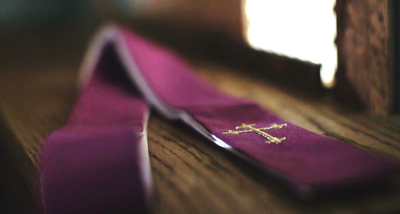고백성사 | Confession

만약에 고해하는 방법에 대해 잘 모르시면, 이 링크로 가시면 도움이 되는 안내를 받으실 수 있습니다. http://www.bustedhalo.com/wp/wp-content/uploads/2009/02/how-to-confess.pdf
죄는 무엇보다도 하느님을 거스르는 것이며, 곧 하느님과의 교감이 끊어지는 것입니다. 동시에 교회와의 교감도 손상시킵니다. 이러한 이유로 회개에는 하느님의 용서와 교회와의 화해가 수반되며, 이것은 보속과 화해의 고해 성사에 의해 전례적으로 표현되고 완성됩니다.
오직 하느님께서만 죄를 용서해 주실 수 있습니다. 예수님께서는 하느님의 아들이시기 때문에 자신에 대해, “사람의 아들이 땅에서 죄를 용서하는 권한을 가지고 있다” 고 말씀하셨고: “너는 죄를 용서받았다.” 하시면서 이 신적 권한을 행사하십니다. (요한 20,23.)
– 가톨릭교회 교리서 #1440-1441
Confession, also known as the Sacrament of Reconciliation, is offered 30 minutes before Holy Mass everyday except Tuesdays. The confessional doors are found just past the entrance to the left. The confessional entrance has a light above the doors; GREEN means ‘go in’ and NO LIGHT means ‘stop, someone is already inside.’ Confessions are all heard behind a screen. However, if someone wishes to confess face-to-face with the priest, this can be requested separately.
If you are not sure how to go to Confession, follow this link and you will find a helpful guide.
Sin is before all else an offense against God, a rupture of communion with him. At the same time it damages communion with the Church. For this reason conversion entails both God’s forgiveness and reconciliation with the Church, which are expressed and accomplished liturgically by the sacrament of Penance and Reconciliation.
Only God forgives sins. Since he is the Son of God, Jesus says of himself, “The Son of man has authority on earth to forgive sins” and exercises this divine power: “Your sins are forgiven.” Further, by virtue of his divine authority he gives this power to men to exercise in his name (see John 20:23.)
– Catechism of the Catholic Church #1440-1441
Questions about Confession
Why do I have to confess my sins to a priest?
- Jesus told His apostles that just as God the Father had sent Him — and God the Father sent Him to save us from our sins — so He was sending them. Jesus breathed on them the power of the Holy Spirit, giving them God’s power to forgive sins, since no one can forgive sins but God alone. He told them that whatever sins they forgive are forgiven and whatever sins they retain are retained (Jn 20:21-23; Mk 2:7). Since the apostles were unable to read minds, the only way that they would know which to forgive and which to retain is if people told them their sins. Just as Jesus uses ministerial priests to give us His Body and Blood at Mass so He uses them to give us His mercy in Penance.
How often am I to go to Confession?
- The Church recommends that Catholics receive the Sacrament of Penance frequently. Strictly speaking, after they’ve reached the age of reason, Catholics are obliged to confess their serious sins at least once a year (CIC 989), but the minimum should not be made a maximum. Catholics should come to confession as soon as possible after they’ve committed a mortal sin. If they’re seeking to grow in holiness, the regular practice of confession at least once a month is recommended.
Should I go to confession if I haven’t committed any sins since my last confession?
- “The just man,” the Book of Proverbs tells us, “falls seven times a day” (Prov 24:16). If you’re struggling to find matter to confess, examine your conscience on your sins of omission, on the seven capital sins or on whether you in fact love the Lord with your whole heart, mind, soul and strength (Lk 10:27).
How do I examine my conscience well?
- Ask for God’s help and prayerfully examine your actions in the light of Christ’s teaching and example. There are "Examination of Conscience" pamphlets on a rack next to the confessional for your assistance.
Some review their behavior by the Ten Commandments, others by Christ’s command to love God and love others, others by reviewing the beatitudes, others by examining themselves with Christian virtues, and others by the seven “capital” sins (pride, envy, anger, sloth, greed, lust and gluttony). It is best to examine, not whether or not one has broken the commandments, but on how one has damaged their relationship with God and others by their actions or lack of actions.
How do I grow in contrition of heart?
- There are two types of contrition: sorrow over hurting one we love (called perfect contrition) and sorrow over getting caught or over the punishment that comes because of sin (imperfect contrition). We should ask God to help us achieve that perfect contrition in which we are sorry for having wounded the God who loves us and whom we should love in return. Meditation on the consequence of ours sins — Christ’s brutal death on the Cross — often helps us to grow toward perfect contrition.
May I go to confession and receive absolution if I am divorced?
- If you are civilly divorced but have not remarried or were validly married in the Church after receiving a declaration of nullity for your first marriage, then, yes, you may receive the Sacrament. If you have remarried outside of the Church or have entered into a cohabitating relationship, then those predicaments must be addressed before you can receive absolution. Pope John Paul II addressed this situation in 1981. “The church reaffirms her practice, which is based upon sacred scripture, of not admitting to Eucharistic communion divorced persons who have remarried. They are unable to be admitted thereto from the fact that their state and condition of life objectively contradict that union of love between Christ and the Church that is signified and effected by the Eucharist. ... Reconciliation in the sacrament of penance, which would open the way to the Eucharist, can only be granted to those who, repenting of having broken the sign of the covenant and of fidelity to Christ, are sincerely ready to undertake a way of life that is no longer in contradiction to the indissolubility of marriage. This means, in practice, that when, for serious reasons such as, for example, the children's upbringing, a man and a woman cannot satisfy the obligation to separate, they ‘take on themselves the duty to live in complete continence, that is, by abstinence from the acts proper to married couples’” (FC 84). If you’re in these circumstances, you are encouraged to talk to a priest in the light of God about your present situation and possibly begin an investigation of whether your first marriage was valid.


